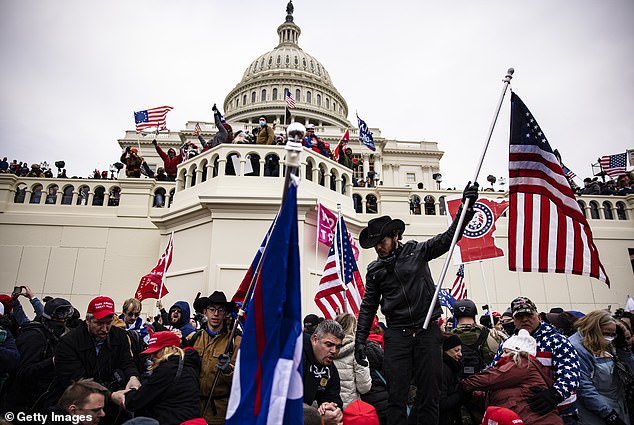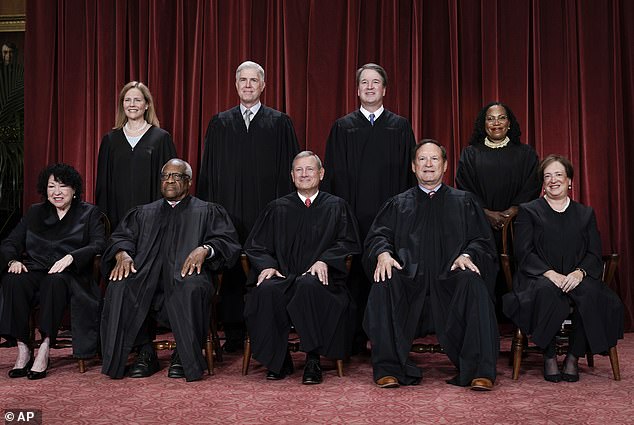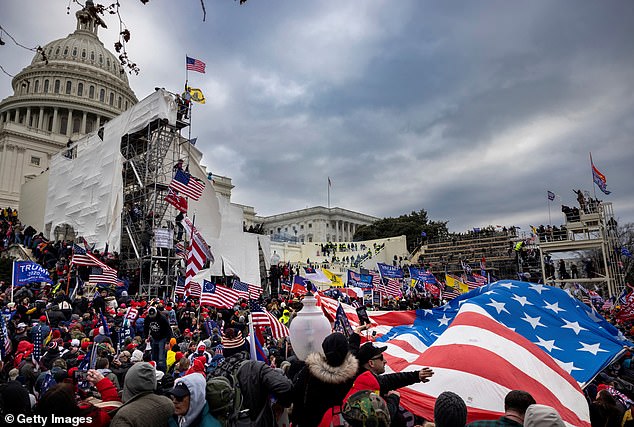The Supreme Court has ruled there are limits to charging the Jan. 6 rioters with obstruction, in a case that will impact former President Trump’s 2020 federal election interference case.
The 6-3 decision could upend hundreds of cases stemming from the Jan. 6 riots, including Donald Trump’s election fraud trial.
The court’s ruling makes it difficult for the January 6 defendants to be charged with obstructing an official proceeding, which carries up to 20 years in prison.
That’s one of four charges former President Donald Trump faces in the federal case brought by special counsel Jack Smith.
The decision is poised to overturn hundreds of cases stemming from the January 6 riots, including Donald Trump’s election fraud trial.
At least 152 people have been convicted of obstructing an official proceeding, according to the Associated Press, a crime punishable by up to 20 years in prison.
In total, charges have been filed against some 350 people accused of trying to prevent Congress from certifying Joe Biden’s 2020 election victory.
The case was brought by former Boston police officer Joseph Fischer, who was charged with seven counts after the Nov. 6 riot, including one count for anyone who “corruptly…obstructs, influences, or impedes any official proceeding.”
Justice John Roberts, who wrote the opinion Friday, limited the charge of “obstruction of Congress” that has been used by the federal government to prosecute the Jan. 6 defendants.
Roberts called that law, which carries a 20-year prison sentence, “one of the harshest potential punishments.”
A broad interpretation of the law “would also criminalize a wide swath of prosaic conduct, exposing activists and lobbyists to decades in prison,” Roberts continued.
On average, the sentence for obstruction for those rioters already convicted was 28 months, according to a Washington Post database.
Justices Elena Kagan and Sonia Sotomayor dissented and were joined by Justice Amy Coney Barrett.
Attorney General Merrick Garland said he was “disappointed” by the court’s decision.
“This limits an important federal statute that the Department has sought to use to ensure that those primarily responsible for that attack face appropriate consequences,” Biden’s top law enforcement official said.
A lower court dismissed the charge after Fischer’s lawyers argued that he did not attempt to interfere with any documents or records.
Federal prosecutors appealed and a three-judge panel of the D.C. Circuit reinstated the charge.
Trump faces four charges brought by the special counsel: conspiracy to obstruct an official proceeding; obstruction and attempted obstruction of an official proceeding; conspiracy to defraud the United States; and conspiracy to deprive citizens of their right to vote.
Trump has pleaded not guilty to these charges and dozens of other charges stemming from three other criminal proceedings.
His trial has been postponed until the Supreme Court decides whether he has immunity from prosecution.
The decision comes as Trump faces criminal charges in three criminal cases and has already been found guilty of 34 counts of falsifying business records in New York last month.
He is the first former president to be convicted of a crime.

At least 152 people have been convicted of obstructing an official proceeding, according to the Associated Press, a crime punishable by up to 20 years in prison.
During oral arguments that addressed some wild hypotheses, the justices appeared to reject granting presidents absolute immunity, but their line of questioning suggested they might delay Trump’s trial while he runs for president for a third time.

Trump faces four charges brought by the special counsel: conspiracy to obstruct an official proceeding; obstruction and attempted obstruction of an official proceeding; conspiracy to defraud the United States; and conspiracy to deprive citizens of their voting rights.
Liberal judges fear that granting full immunity to a ruling president is no different than creating a king who has the power to stage a military coup or assassinate political opponents.
The conservative justices signaled they wanted to provide at least some legal safeguards to protect Trump and future presidents from impeachment.


